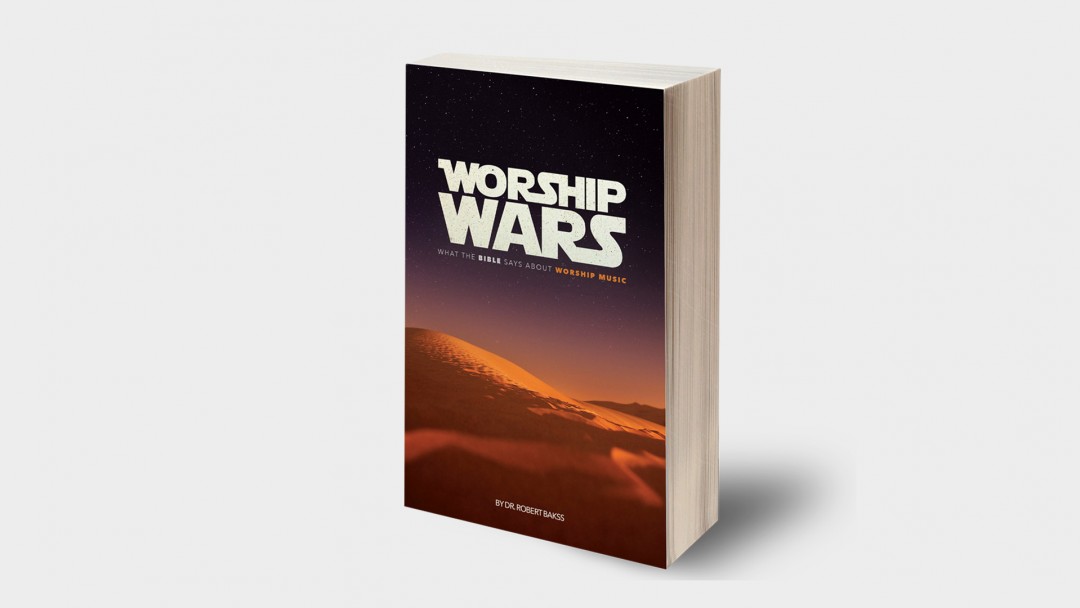Over the past few years the Lord has led me on a journey that brought great growth to my personal relationship with Jesus. Sadly, I had developed some poor theology relating to music that left me in bondage to tradition.[1] Christian music became a duty not a delight because I lived in fear of inadvertently displeasing God with a wrong selection.[2] So I set a “high standard” for what I would listen to and allow in our church. How did I arrive at such high standards? Instead of doing the proper research, I willingly abdicated my responsibility and found it easier to appropriate the preferences of those in denominational leadership.[3] Furthermore, I grew impatient with those who dared to differ from my adopted high standards. Yet God graciously led me out of this trap and set me free to see and experience the great beauty of praising and worshiping Him through music.
My journey included an exhaustive study of worship music in the Bible, dozens of books relating to the subject, and countless conversations with godly ministers and lifelong Christians. As a child of God I was seeking the truth, I was seeking God’s will on the matter, and I believe He led me as I was faithful to understand His written Word. Oh, how many hours I could I have saved by having the fantastic resource recently written and produced by Robert Bakss. For in one volume Bakss is able to compile and deliver what took me years of research to understand. This book is a gift to the Independent Baptist movement for several reasons:
1. This Book is Biblically Sound
Rarely have I read a book about music that contains so much Scripture. Check it out for yourself! The discussion on worship music typically consists of psychological arguments (2nd and 4th beat), sociological arguments (the decay of tradition), or subjective arguments (it sounds “worldly”). Here we see a book deeply rooted in the whole counsel of God and expertly exegeted in proper context. From beginning to end this book is a Bible study in the topic of worship music.[4]
2. This Book is Historically Relevant
I cannot say with any credibility that I am a great student of history. However, I do love to study the past so that I may better understand the present. The Civil War lasted for four years. World War II lasted seven. The Iraq War dragged on for eight years. Even the Hundred Years War between the English and the French ended after 118 years! Yet the “Worship Wars” have been going on for centuries. Innovators vs. traditionalists have argued over Exclusive Psalmody, the use of musical instruments, and the introduction of the pipe organ. Many may be surprised to know that the beloved gospel songs of Ira Sankey were mercilessly ridiculed by the high church traditionalists of the day. Understanding that this is not a new battle will shed much light on the current discussion of our day.[5]
3. This Book is Graciously Delivered
The caustic tone that can develop during this discussion is the reason many good men stay away from the topic all together. You are labeled a legalist if you simply choose to have a more conservative position. You are labeled a liberal if you feel led to have a more progressive position. This kind of name-calling must stop![6] I would not recommend this book if Bakss fell into this divisive trap. I have friends, much more godly than I, who are deeply conservative with their musical selections for private and public worship. I have friends, much more godly that I, who allow music in their home and church that I would not. Yet we are all friends! More so, we are brothers in Christ, advancing the Kingdom of God and fighting back the true enemy.[7] We don’t need another shrill sermon, angry blog, or bitter book. (Lord knows that I’ve been guilty of the first two.) What we need is the work that Robert Bakss has provided us. His thesis is graciously argued with the spirit and love of Christ.
4. This Book is Needed by the Next Generation
There are political reasons that many will not be able to publically agree with this book. It will matter very little that the arguments are Biblical, rational, or historical. There are pastors who would lose 50% of their congregation if they were to reverse their position on music. There are missionaries who would lose 90% of their support if they were to express a differing view. There are evangelists who would receive multiple cancelations. Ministry leaders who need denominational support will watch their institutions undergo attacks by petty & divisive men[8] who are more interested in overseeing the harvest fields of others than actually getting in the whitening fields themselves.[9] Don’t misunderstand, some will disagree with the contents of this book out of genuine conviction[10], sadly others will have to disagree because to do otherwise would be politically damaging.
Regardless, this book is needed by the next generation of leaders within the Independent Baptist movement. We must learn how to reach the world with the Gospel of Jesus Christ in the 21st century without being unnecessarily shackled to the methods of the 20th (or 19th) century. We can be world-changers not simply care-takers if we remember what is key to our movement: Biblical authority, local church autonomy, personal liberty, innovative ministry, and evangelistic intensity.
5. This Book is a Humble Confession
What I probably love most about this book is the genuine life story it tells. Bakss was a lawyer who received Christ as Savior. He was reached, discipled, and trained by the Independent Baptist movement who gave him a great heritage of faith as well as several unnecessary but mandatory traditions. We are able to watch as the author systematically addresses the Biblical concepts of worship music with the curiosity and proficiency of an attorney. He simply weighs the evidence and comes to a conclusion. What he discovers will surprise you. What he does will inspire you!
Buy the book today at http://worshipwars.com [11]
Questions? Comments? Queries? Complaints? Let me know your thoughts in the comment section below:
[1] Matthew 15:9
[2] Matthew 23:4
[3] Acts 17:11
[4] 2 Timothy 2:15
[5] Ecclesiastes 1:9
[6] 1 Corinthians 3:3
[7] Ephesians 6:12
[8] Jude 1:12
[9] Galatians 2:4
[10] Romans 14:3-4
[11] If you are a ministry leader / church planter and cannot afford to purchase a copy, please email me at pastor@southernhills.church and I will personally send you a free copy.




6 Comments
Mark Garland
November 10, 2015 at 2:09 pmHey Josh,
Thank for your words. Sometimes it seems difficult to look past traditions and preconceived ideas we learn along life’s journey. Looking into God’s face (his Word) and thinking what would Jesus do can be life altering. Reading the way He dealt with people and the company He kept. Looking at scripture threw the
Anonymous
March 2, 2016 at 9:15 pmThis review should also be read through to get a biblical analysis of this book and the potential errors it leads to.
http://www.wayoflife.org/free_ebooks/downloads/A%20Baptist%20Church%20on%20the%20Slippery%20Slope.pdf
Becca
March 2, 2016 at 9:40 pmHis message is, “You like heavy metal and hip hop? Go for it, baby! It’s all about you and your taste and your ministry.” This sounds exactly like the apostasy described in 2 Timothy 4:3-4!
-David Cloud
This musical philosophy is pouring and sometimes slowly seeping into our Baptist churches and colleges. What a shame for our precious young people.
Cody Harned
March 31, 2016 at 11:58 pmVery interesting article, I have often struggled with the whole music issue since a lot of people growing up were always completely against more contemporary styles, and a lot of my friends are as well. When I get out of school I will have to get a copy, and read it for myself! Thanks, Josh
Skip Woodfin
April 16, 2016 at 7:55 pmEveryday I enjoy singing to the Lord. I was never plagued by feelings that music was all about being loyal to denominational tradition. I never felt any bondage – only liberty through the cross to sing to Jesus. I love to sing. It has been one of the great joys of my life. I love praising the Lord!
The depth of my experience does vary. Most of the time that is my fault because here is something wrong in my life or I am preoccupied. As an example my mind is preoccupied in a church service sometimes because of dozens of things going on, but when I stop and remind myself to sing unto the Lord and others in a church service the sense of worship is meaningful.
I am only in church a few hours a week, so my singing to the Lord is not limited to that. Singing throughout the day is my experience. Is there someone stuck or intimidated in some cold musical tradition? That is easily corrected by loving obedience to Christ. Ps 98:4 Make a joyful noise unto the LORD, all the earth: make a loud noise, and rejoice, and sing praise.
Ex 15:1 Then sang Moses and the children of Israel this song unto the LORD, and spake, saying, I will sing unto the LORD, for he hath triumphed gloriously: the horse and his rider hath he thrown into the sea.
Jg 5:3 Hear, O ye kings; give ear, O ye princes; I, even I, will sing unto the LORD; I will sing praise to the LORD God of Israel.
1Ch 16:9 Sing unto him, sing psalms unto him, talk ye of all his wondrous works.
1Ch 16:23 Sing unto the LORD, all the earth; shew forth from day to day his salvation.
Ps 13:6 I will sing unto the LORD, because he hath dealt bountifully with me.
Ps 30:4 Sing unto the LORD, O ye saints of his, and give thanks at the remembrance of his holiness. {at…: or, to the memorial}
Ps 33:2 Praise the LORD with harp: sing unto him with the psaltery and an instrument of ten strings.
Ps 33:3 Sing unto him a new song; play skilfully with a loud noise.
Ps 57:9 I will praise thee, O Lord, among the people: I will sing unto thee among the nations.
Ps 66:4 All the earth shall worship thee, and shall sing unto thee; they shall sing to thy name. Selah.
Ps 68:4 Sing unto God, sing praises to his name: extol him that rideth upon the heavens by his name JAH, and rejoice before him.
Ps 68:32 Sing unto God, ye kingdoms of the earth; O sing praises unto the Lord; Selah:
Ps 71:23 My lips shall greatly rejoice when I sing unto thee; and my soul, which thou hast redeemed.
Ps 95:1 O come, let us sing unto the LORD: let us make a joyful noise to the rock of our salvation.
Ps 96:1 O sing unto the LORD a new song: sing unto the LORD, all the earth.
Ps 96:2 Sing unto the LORD, bless his name; shew forth his salvation from day to day.
Ps 98:1 O sing unto the LORD a new song; for he hath done marvellous things: his right hand, and his holy arm, hath gotten him the victory.
Ps 98:5 Sing unto the LORD with the harp; with the harp, and the voice of a psalm.
Ps 104:33 I will sing unto the LORD as long as I live: I will sing praise to my God while I have my being.
Ps 105:2 Sing unto him, sing psalms unto him: talk ye of all his wondrous works.
Ps 147:7 Sing unto the LORD with thanksgiving; sing praise upon the harp unto our God:
Ps 149:1 Praise ye the LORD. Sing unto the LORD a new song, and his praise in the congregation of saints.
Isa 12:5 Sing unto the LORD; for he hath done excellent things: this is known in all the earth.
Isa 42:10 Sing unto the LORD a new song, and his praise from the end of the earth, ye that go down to the sea, and all that is therein; the isles, and the inhabitants thereof.
Jer 20:13 Sing unto the LORD, praise ye the LORD: for he hath delivered the soul of the poor from the hand of evildoers.
Ro 15:9 And that the Gentiles might glorify God for his mercy; as it is written, For this cause I will confess to thee among the Gentiles, and sing unto thy name.
Skip Woodfin
May 15, 2016 at 1:57 amMuch calling of names in the book. How is that gracious?
It is wrong to state the conservative position is “opposition to new songs.” Of course this makes conservative folks look like idiots, since all songs were new at some point, but the only problem is that is not the position of the conservative folks I know.
It is wrong to characterize old songs as merely “about the Lord” and lacking because they are not “to the Lord.” Try this beautiful old song, “My Jesus I love thee, I know thou art mine.”
What’s my point? If greater harmony was the goal of the book then why use inflammatory language, call names of individuals of different opinions, and make false representations of positions. Perhaps a purely Biblical study would have been more helpful in bringing harmony, but the author appears to want to win arguments rather than win friends.